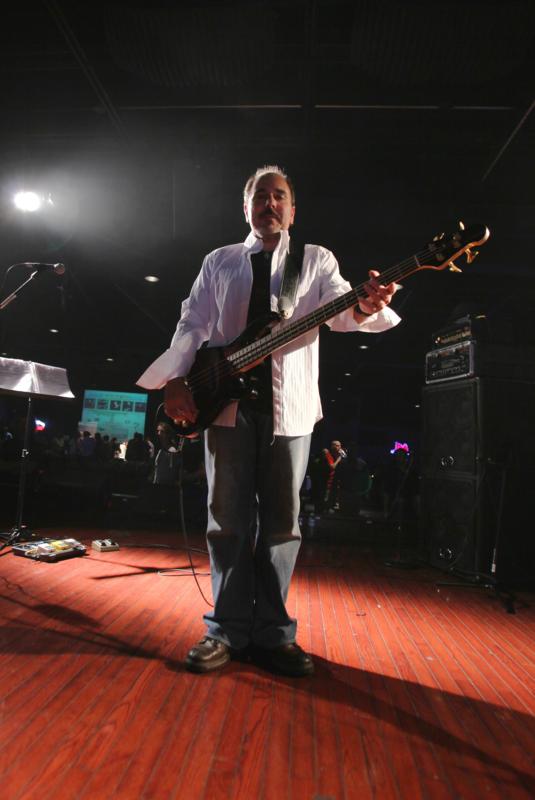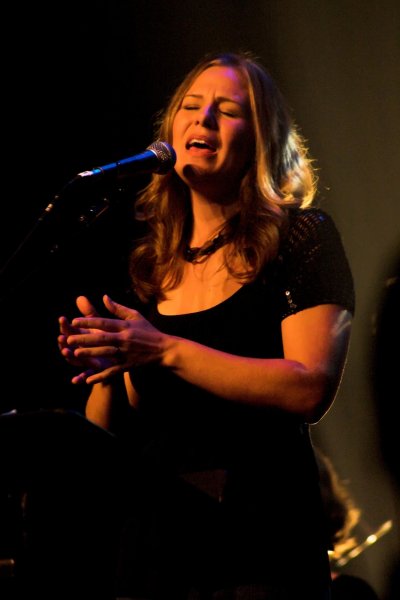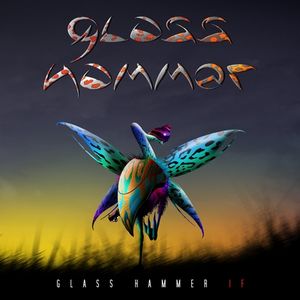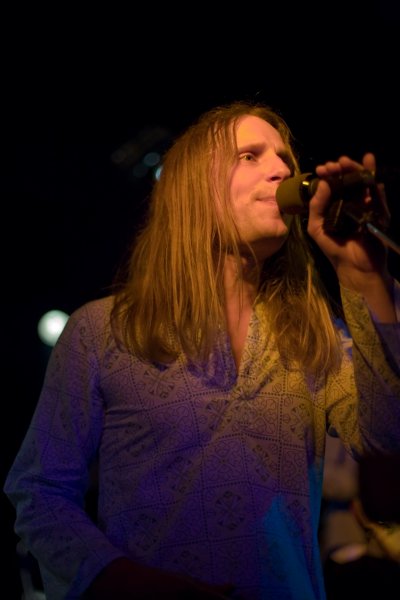|
Interview Fred Schendel and Steve Babb (Glass Hammer) “IF is by no means a reaction to anything that was said about the Three Cheers album” (January 2011, text by Henri Strik, edited by Peter Willemsen, pictures from Glass Hammer website) In my review of the latest Glass Hammer album IF, I wrote that one of America's leading progressive rock band are back on track with a new masterpiece. However, we would like to know what actually happened before they recorded one of the prog highlights of 2010. After all, their penultimate album Three Cheers (review) wasn't really appreciated by the press and by their fans. So we're glad that founding members Steve Babb and Fred Schendel are willing to give some explanation for Background Magazine.
Carl Groves and Susie Bogdanowicz did the lead vocals for Culture Of Ascent. Why didn't you ask Jon Anderson to do some real lead vocals too? Fred Schendel: “Well, we did, of course, but he just didn't have time for that kind of commitment. Moreover, I really think that he didn't want to lend his voice as a lead to a project he wasn't invested in as a writer and guiding creative force. It's totally understandable and we were thrilled beyond words that he contributed all the great parts that he did. It was a dream came true for us.”Steve Babb: “He hinted around at one point that he might like to sing the lead for Glass Hammer, but I think he was mostly kidding. Of course I told him he could have the job! And I'm pretty sure Susie Bogdanowicz and Carl Groves would have understood! What he ended up singing for us fits perfectly, however. He's absolutely my favourite singer in prog music, and he was a huge inspiration for me since I was a teenager. Just as Fred said, it was a dream came true...” Has Culture of Ascent a certain concept or theme? Why did you use a few lines from Matthew Arnold's poem The Buried Life on the last page of the booklet? 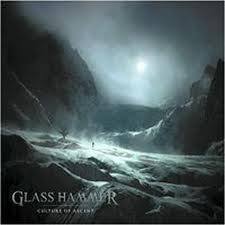 Steve Babb: “The poem expresses
the idea of longing, and conveyed the feeling I wanted to share with fans as
they listened to the music and read the lyrics. If Victorian Romanticism
appeals to you, as it does to me, then the quote just sets up the album you're
about to hear. The concept of the album relies upon the metaphors of flying and
mountain climbing to express spiritual longing. I had just read some books on Mount
Everest and in addition, some articles on C. S. Lewis about these very ideas -
nostalgia, romanticism and longing. All of this played a big part in what I
wanted to say with Culture Of Ascent.
Here's another quote by Lewis that
I read just before working on the lyrics: 'Only when your whole attention and
desire are fixed on something else - whether a distant mountain, or the past,
or the gods of Asgard - does the 'thrill' arise. It's a by-product. Its very
existence presupposes that you desire not it, but something other and outer...' In
Life By Light
I finished that very thought with this line: 'If we search
for something not of earth then we search out this cold rock in vain.'
In essence the whole thing is about the
attempt to attain spiritual heights and the dangers and risks of doing so.”
Steve Babb: “The poem expresses
the idea of longing, and conveyed the feeling I wanted to share with fans as
they listened to the music and read the lyrics. If Victorian Romanticism
appeals to you, as it does to me, then the quote just sets up the album you're
about to hear. The concept of the album relies upon the metaphors of flying and
mountain climbing to express spiritual longing. I had just read some books on Mount
Everest and in addition, some articles on C. S. Lewis about these very ideas -
nostalgia, romanticism and longing. All of this played a big part in what I
wanted to say with Culture Of Ascent.
Here's another quote by Lewis that
I read just before working on the lyrics: 'Only when your whole attention and
desire are fixed on something else - whether a distant mountain, or the past,
or the gods of Asgard - does the 'thrill' arise. It's a by-product. Its very
existence presupposes that you desire not it, but something other and outer...' In
Life By Light
I finished that very thought with this line: 'If we search
for something not of earth then we search out this cold rock in vain.'
In essence the whole thing is about the
attempt to attain spiritual heights and the dangers and risks of doing so.” The next release was Three Cheers From The Broken Hearted that drifted away even further from the progressive rock path. I read in an interview that you had to make this album. Why? Fred Schendel: “We had to make it in the sense that we were creatively compelled to go that direction, not by any sort of contractual or legal way. We had to get away from the big capital 'P' to clear our minds and have some fun. It was a genuinely fun to record this album and it got us back in the mood to make an album like IF.”Steve Babb: “At the time I was completely exhausted with traditional prog and I didn't think I could go further with it, at least not without a break. So, if I hadn't been involved with Three Cheers then I probably wouldn't have made another album at all. Having said that I'm 'recovered' now and I'm ready to explore symphonic-prog all over again.” The album was principally made by three people. Was that a reason to use 'three' in the album title? Why did you record the album as a trio? Fred Schendel: “Yes, that was a definite reference for the title, though the line itself came from a song lyric and it was just a coincidence. We did the album as a three-piece to keep the hassle and frustration factor down. It made it fun and fast. Because it was the type of music that Steve and I felt comfortable performing on our own, it was more fun to do it like that instead of having to filter all the ideas through other people. And Susie had deserved a full album as lead singer for years after only being in the spotlight here and there.”Does Three Cheers have a special theme or concept either? 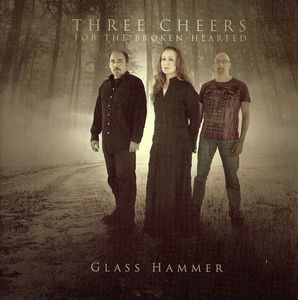 Fred Schendel: “It certainly has
themes though we didn't set out to write with anything specific in mind.
Usually we are at a place whenever we do an album that certain ideas will dominate
our thinking when we have to come up with something to sing about.”
Fred Schendel: “It certainly has
themes though we didn't set out to write with anything specific in mind.
Usually we are at a place whenever we do an album that certain ideas will dominate
our thinking when we have to come up with something to sing about.”Steve Babb: “For my part, there was a lot of cynicism and bitterness that needed to get worked out on the album. I normally don't put much of my personal life into the lyrics, but Three Cheers was a great opportunity to do so. In a way, it's about the death of the American Dream and the breakdown of established, formerly trustworthy institutions. Things have been crazy here in the USA ever since the 2008 elections. But the craziness has effected other things besides our politics and our government. The Curse They Weave certainly voices my anger at the betrayal many were feeling at the time. Lyrically speaking, Three Cheers is not a happy album. And yet musically, there's still a lot of really cool, 'happy' stuff going on there. It's a fun album to listen to, at least for me.” How did singer Carl Groves, guitarist David Wallimann and drummer Matt Mendians react to the fact that they weren't invited to perform on Three Cheers? Fred Schendel: “Everyone was fine. They all have individual projects to stay busy with besides us. David moved to Colorado so his time was nearing an end anyway. Carl was working on the new Salem Hill release and Matt has a solo album just about ready to come out.”Steve Babb: “Carl was out of the country at a crucial time during the album's development. And David played on one song actually. We are all still very supportive of each other, and for my part, they are all still considered friends. I imagine that we'll try to work with Carl at some point down the road if he's willing.” Did you record the drums on Three Cheers on a real drum kit or did you take it from computer and keyboard samples? Fred Schendel: “ Three Cheers was done mostly with me playing and triggering samples, but a couple songs were programmed outright; basically the fast ones like on Hyperbole. It raised our production value immensely and frankly, I was dying to have a chance to play again.”Three Cheers featured the Zombies-cover A Rose For Emily. Why did you cover this song? Are you a fan of Rod Argent? Steve Babb: “I had been listening to a lot of different music at that time. I was really getting into the psychedelic pop of the sixties and soon became a Zombies-fan. I thought Rose For Emily was a forgotten gem when I heard it. It's a beautiful, hauntingly sad song. I'd also been listening to a lot of female-fronted trip-hop bands and it occurred to me that Susie's voice would be a great match for this song. My version is influenced a good bit by two groups: The Bird And The Bee and Hooverphonic. Yes, I love much of Rod Argent's work.”Glass Hammer played at the Three Rivers Festival after the release of Three Cheers. I believe, this concert was filmed and taped. Are you going to release those recordings on a live CD or DVD? Fred Schendel: “Well, it wasn't multi-tracked so any CD release would be basically a bootleg tape. And the video was just what fed the live in-house video screens, but it looked very cool. Beyond YouTube-website I wouldn't expect to see any of it, though.”Steve Babb: “I will try to put some more 3RP video on YouTube in the future, time permitting. It was a really fun show to play, great staff and a terrific audience!” How did you react when you read all the negative reviews about Three Cheers? Was it the reason to return to the musical style that made you popular in the progressive rock scene? Fred Schendel: “I didn't care about the reviews, honestly. I love the album, it's one of the few we've made that I can listen to now, because I don't hear any mistakes and things I think should be fixed. I really hope that as time goes by people will give the album a chance in context and enjoy it as a good rock album as opposed to an album that simply isn't an epic prog album. And we always expected the follow-up to be extremely proggy so no, it had nothing to do with the reviews though the whole affair seems to have worked in our favour, it's good to have fans feel we listen to them. We do, really. We want our listeners to be happy.”Steve Babb: “IF is by no means a reaction to anything that was said about Three Cheers. If I were to go looking for negative comments on the internet, which I don't of course, I could find bad reviews of every album we've done. Of course, I would have much preferred to have read outstanding reviews of Three Cheers, but I'm still very happy with the album. We returned to symphonic prog, because we were ready to do so and thought we could make a good job of it. That's the only reason.” In my short review of Three Cheers I used my wife's visit to the hairdresser as a metaphor. She returned with a different haircut I didn't like that much, but I still love her. Did you read it and what do you think about this comparison? Fred Schendel: “I'm sure I did, I read all your reviews! That's actually a great metaphor. It's great for us that we have a lot of fans that are forgiving and don't write us off when we do something that goes outside their comfort zone.”Steve Babb: “We certainly can't make our fans love an album, so I'm glad they are generally prepared to stick with us to see if future albums are worth their time. And that is what you did! I know that historically, bigger prog bands from the seventies have taken their music into new directions and have picked up fans in some cases and lost fans in others. Typically, they don't seem to care about 'going back' to their roots, or are unable to. We may, from time to time experiment with a new sound or a new direction. But I think it's safe to say that the symphonic-progressive genre is where we will always be most comfortable as a band. As with women and their hair - you can always grow it back!”
Why did you record IF with an entire new line-up? Would you please introduce the musicians? Fred Schendel: “We didn't really set out to make a new line-up; it happened very naturally and organically. One day we just looked around and they all appeared. We found Jon Davison on a YouTube video and enlisted him for one song on the reworking we're doing of Inconsolable Secret. It went so well that we asked him to do the whole album that became IF. He's a great writer who can play guitar and bass as well. Alan Shikoh was involved in several projects at our studio and is primarily interested in jazz, but also loves 'old school' prog. Most of the music we like came out twenty years before he was born! But he really understands both how to play in our style and also the kind of sound we're looking for.”Steve Babb: “I need to get some biographic information up on the website about our new guys, but there has been a lot going on lately and not much time for updating. Jon was, and still is on a limited basis, the bass guitarist for Sky Cries Mary. He also sang for the Yes tribute band Roundabout. Alan is younger of course, so he hasn't had much exposure in the music world - not until IF of course.”
Would you please briefly explain the lyrics of all tracks? Steve Babb:Beyond Within: “This one belongs to Fred. It's all about questions. What's our place in the universe? Is there a creator and is there a meaning? At least that's how I take it.” Behold The Ziddle: “Fred and Jon's lyrics some of which are based on an earlier version I wrote. It's all based on a dream my eight year-old had - very creepy, very dark, and from our point of view, very funny!” Grace The Skies: “This is Jon's vision here. It's about breaking free, using the metaphor of a bird in flight. We refer back to some of this in the album's finale.” At Last We Are: “This one's mostly my own invention with a couple of lines by Jon. This song is lyrically and musically connected to the next two. I refer to a singer who I can hear in the distance. His song haunts me, and I do my best to search him out. It works in two ways for me. In the first, it's about God as our Father and my own search for Him in life. It ends, poetically, in Heaven where He 'welcomes us home at last'. In the other sense, it's about my nostalgic love of seventies symphonic-prog and our attempt to recapture the feelings we all had the first time we heard our favourite prog albums. For the listener, I' I'll leave it open to interpretation. It may mean different things to different people and that's fine by me!” If The Stars: “Once again we hear the 'the call to come home'. Jon wrote most of this with some help from me and Ralph Waldo Emerson.” If The Sun: “Fred wrote the first half and I wrote the last half. Jon wrote the line 'If the sun could launch a thousand dreams...' from whence we get the title. Once again, it's about going home. It sort of picks up where Into Thin Air and Rest from Culture Of Ascent left off. We're on the peak of the mountain, but ready to go higher. We take a look back at what we've left behind and then 'run for home'. Home is a metaphor for Heaven, or to better days. The listener can decide for himself which it means.” Did you have to blow away the dust from the instruments that Glass Hammer used on Lex Rex and Shadowlands? Did you know were you put away the Mellotron, Moog and Hammond-organ? Fred Schendel: “Of course, even on Three Cheers there are a lot of classic keyboard sounds, if you listen. Those are the things I gravitate to so there was no problem firing them back up.”Steve Babb: “My Yamaha CS-5 is still alive, but needs a lot of coaxing to get the sounds out of it that it used to make. I pulled it out of the closet for IF but I'm not sure if it made the cut in the final tracks.” Was it easy for you to come up with all the beautiful progressive rock songs and epics for this new album or did you had to do something to get inspired? Fred Schendel: “It was very natural. The writing process for this album was fast and especially when Alan and Jon came on the project it all flowed very easily.”Steve Babb: “I listened to Tarkus and Trilogy from Emerson, Lake & Palmer a lot while driving in the car. That provided a little inspiration for At Last We Are, but so did my old Camel CD's. Otherwise, I think we were both really ready to write a new album. In fact, we're already starting to form ideas for the next album. But we aren't doing anything special to prepare for it.” Do you agree that the style of drumming by Randall Williams fits the music of Glass Hammer better than Matt Mendians's style? Fred Schendel: “Well, for this project I think it does. Matt is great though and we love what he did on Inconsolable Secret and Culture Of Ascent. But for IF I don't think anyone could have fit the feel of the music better than Randall.”Will Randall also be playing in the live band together with the other new members? Fred Schendel : “Randall is a studio musician, so we're not sure at this point.”Steve Babb: “Fred and I will be rehearsing in early December with a drummer who we've known and worked with for years. If things go well, he'll be our new live drummer.” You recruited Jon Davison for IF. Did you purposely look for a singer who resembles Jon Anderson's voice or was it just a coincidence?
The artwork of the album cover reminded me of Roger Dean's style. Did you ask him to design it or was Tom Kuhn your first choice right from the start? Steve Babb: “I decided from the beginning that I wanted an album cover with a lot of colour in it, instead of the dreary looking images we've used for the last three years. Tom is into Roger Dean the way we're into Yes. He shares the same graphic 'philosophy' that I do as well. This means that an album cover should be tied to the music and it should reach out and really grab your attention when you see it. I didn't ask Dean to do this cover, but I thought that with the album leaning towards the sound of what Yes 'might have done', the cover should also appear to be a modern approach to the seventies art of Roger Dean. Both guys are wonderful to work with by the way. Roger was very kind to us and incredibly friendly on the two or three occasions we've met. Tom is very dedicated to the projects he works on, or at least he was with IF.”So far you only performed in your own country. Can we witness the band in Europe some day? Fred Schendel: “We really hope so. Every time we record an album we struggle with the economics that would make a European tour possible. It's one of our great dreams to come and play there. Perhaps next year we will find a way to make it work.”Fred, you once released a solo album that could only be downloaded from the internet. Will it ever be released as a hard copy? Fred Schendel: “We are talking about that, yes. Quite possibly next summer that will happen.”Steve, do you have any plans to record a solo album yourself? Steve Babb: “Truthfully, Three Cheers started out as my solo album! I've got a couple of projects I'd like to try, time permitting - which it probably won't. But if it did, I'd like to do something using a lot of analog synth sounds mixed with acoustic string-instruments and choral voices. That's today. Ask me tomorrow and the answer might be different!”What's next for Glass Hammer and do you have any future plans? Steve Babb: “We're writing material for a new album which will incorporate more creative input from Jon and Alan. We're really excited about that. We have no plans to try to top IF or write IF Volume II. But it will certainly be a symphonic-prog album. Meanwhile, we're also releasing a limited-edition instrumental album called One. 2011 is the twentieth anniversary of the first recordings Fred and I did together. Most people don't know, but we released two albums on cassette just before Journey Of The Dunadan. They've never been released on CD, but I mastered a CD several years ago which contains the best of these two albums. Most likely by the time this interview goes online, our official website www.glasshammer.com, will have signed and hand-numbered CD's of One available for sale.”Thank you for answering my questions and would you please say a final word to our readers? Steve Babb: “Thanks to all your readers who have supported us through the years. Please let them know to drop by our website forum or to join our Facebook-page. We love to meet fans!”More info about Glass Hammer on the Internet: Glass Hammer Website MySpace (samples) review album 'Three Cheers For The Broken Hearted' (2009) review album 'IF' (2010) review album 'Cor Cordium' (2011) review album 'Perilous' (2012) review DVD 'Live at Belmont' (2006) review DVD 'Live at The Tivoli' (2008) Interview Glass Hammer (February 2012, about album release 'Perilous') |

